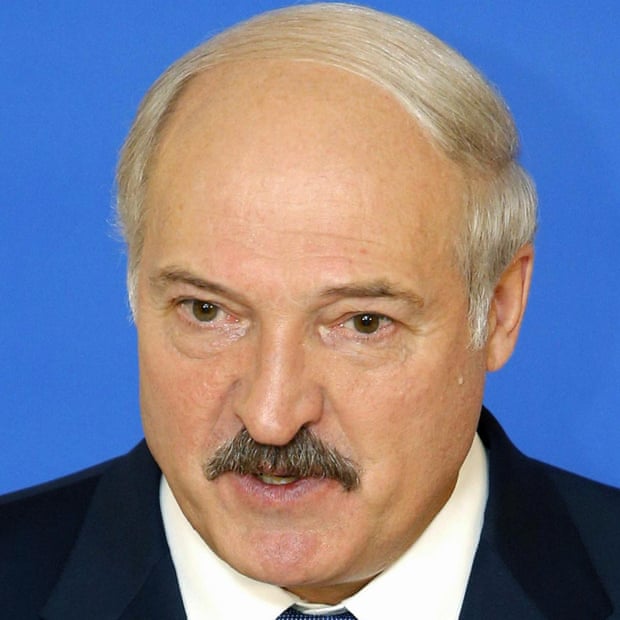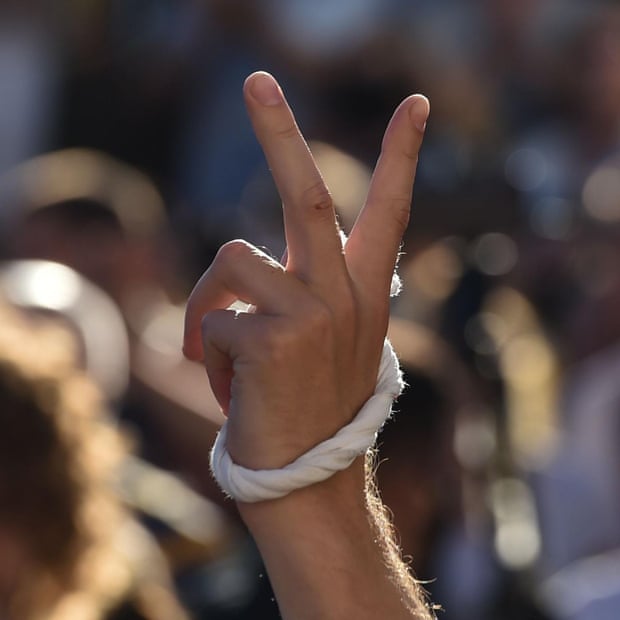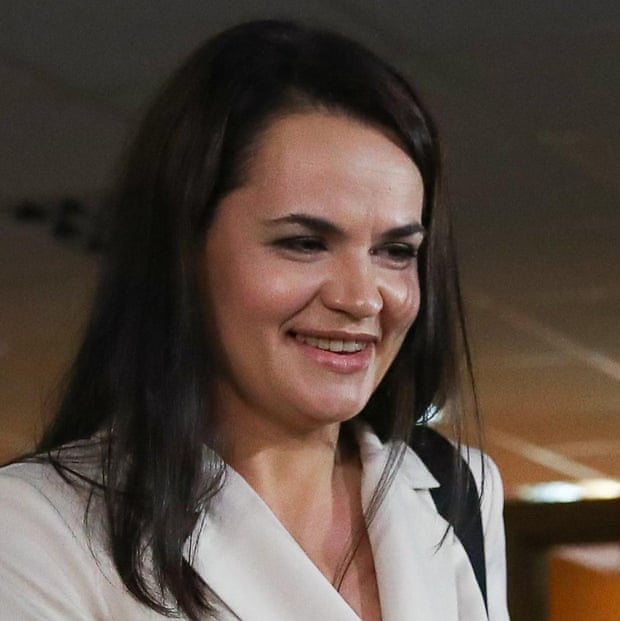Tens of thousands of protesters in Belarus have defied threats of a government crackdown to march through central Minsk, again voicing demands that the country’s authoritarian president, Alexander Lukashenko, should step down.
After two Sundays in which the opposition had called huge rallies in Minsk and been left largely unmolested by riot police, this week the president had promised protests would be met with a tough response.
Cordons of riot police blocked off entrances to the central Independence Square where the rally was due to take place, and there were sightings of police vans, buses packed with troops and water cannon being deployed across the city.
ProfileWho is Alexander Lukashenko?
Show

Born in August 1954 in Kopys, Belarus, Alexander Lukashenko has served as president of Belarus since the establishment of the office in July 1994. On his initial election, Lukashenko set about establishing an effective dictatorship, sustained by shamelessly rigged elections.
Over the years, Lukashenko has offered his people a sort of Soviet-lite system that prizes tractor production and grain harvests over innovation and political freedoms, and the key part of his political offer has always been political and economic stability.
Lukashenko tried to push this line again into the run-up to 2020’s disputed presidential vote, painting Belarus as an island of stability in a world buffeted by economic crises, political unrest and coronavirus. But the scale of discontent has shown that for many Belarusians, this messaging will no longer work.
The 2020 elections have been described as the deepest crisis he has faced in his career, and in order to secure his supposedly crushing victory, Lukashenko required what appears to be some of the most brazen vote-rigging in recent European history. He appears to have subsequently forced his main opponent, Svetlana Tikhanovskaya, into exile.
After the election, in a congratulatory message, Vladimir Putin urged Lukashenko to consider further economic and legal integration with Russia, which the opposition has warned would undermine Belarus’s sovereignty.
The heavy security presence did not deter protesters, with unofficial estimates suggesting that over 100,000 had converged on the centre of Minsk, many holding the red-and-white flags that have become a symbol of the protests. Other towns and cities across the country also held protest rallies.
In Minsk, police detained over 125 protesters in the first two hours of the rally, though without the violence seen in the days immediately after Lukashenko’s contested election win on 9 August. Then, the savage beating of protesters served only to galvanise the insurrectionary mood.
There were isolated skirmishes on Sunday as police tried to grab individuals from the crowd and others attempted to pull them away, while riot police pushed protesters back from several key spots in the city. There were also repeated sightings of armoured personnel carriers in Minsk, although they were not deployed near the crowds of protesters.
Sunday was Lukashenko’s 66th birthday, and organisers called on those attending to bring him “gifts”. A large column of protesters converged on Lukashenko’s residence, heavily guarded by riot police, to jeer and shout from outside. They left abusive placards as well as photographs of those injured by riot police in recent weeks on the ground outside.
There were also chants of “You’re the rat”, after footage released last week showed Lukashenko last flying over protesters in a helicopter last weekend and saying they had “scattered like rats”.
On Sunday morning, Lukashenko and the Russian president, Vladimir Putin, held the latest in a series of recent telephone conversations. A Kremlin readout of the call said Putin wished Lukashenko a happy birthday and the two men agreed to meet soon in Moscow.
The Kremlin has long found Lukashenko to be a frustrating partner, but appears to have settled on propping up the authoritarian leader as a preferable option to allowing the demands of the street protests to be granted.
Putin said in an interview earlier this week that he had put together a special reserve of Russian law enforcement forces that were ready to fly to Belarus at short notice should the situation “get out of control”.
Earlier this week, a Russian plane used to transport the leadership of the country’s FSB security service made a trip to Minsk for the second time in a little more than a week. No details were made public about who was onboard and the purpose of the visit, but it reinforced suspicions the Kremlin is backing Lukashenko and providing him with guidance and support.
Towards the end of last Sunday’s large protest, Lukashenko was pictured dressed all in black and carrying an assault rifle, as he flew over the protests in his helicopter. This Sunday, Lukashenko’s press service said the president was again at his residence, and released another photograph of him striding outside carrying an automatic weapon, though it was unclear if the picture was indeed taken that day.
Quick GuideSymbols of Belarus protest
Show

White bracelets/ballot initiatives
Supporters of Svetlana Tikhanovskaya wore white bracelets to polling stations on Sunday in the hope that a show of popular support for the opposition candidate would prevent election workers from spoiling their ballots. Similar initiatives called for voters to upload photographs of their ballots or to fold them in specific ways, so they would be visible in the ballot box. Supporters later wore white ribbons to protests or tied them to their cars and motorcycles.
Protest anthems
Two songs have been popular at pro-Tikhonovskaya rallies. One is the Kino classic Peremen, or Changes, a perestroika-era song that became a protest anthem in eastern Europe. Two Belarusian DJs were each sentenced to ten days in jail last week for playing the song at a pro-government concert. The other was a Russian translation of the Polish song Walls, which was popular among the workers of 1980s Solidarity movement. The chorus ends: “Then the walls will fall, fall, fall. And bury the old world.”
The Trio and hand symbols
Three women spearheaded the campaign to unseat Alexander Lukashenko, a novelty in Belarus’ male-dominated politics. When Svetlana Tikhanovskaya announced that her campaign would ally with those represented by Maria Kolesnikova and Veronika Tsepkalo, the three women held up hand symbols: a peace sign, a raised fist, and a heart. They quickly became a campaign symbol.
During the past week, authorities in Minsk have cracked down on the few independent journalists in the country, stripping accreditation from 17 Belarusians working for foreign media outlets and deporting several Russian journalists.
The country’s foreign ministry denied accreditation to most foreign journalists who applied, and has denied entry to the country to many who attempted to enter posing as tourists. In contrast, the Russian state outlet Russia Today has been able to broadcast from the country freely.
Commenting on Saturday, Lithuania’s foreign minister, Linas Linkevičius, wrote on Twitter: ‘“Today’s massive withdrawal of accreditations from foreign journalists representing world’s major independent media outlets is a total disgrace. Such a pathetic step only further highlights a moral bankruptcy of the de facto authorities of Belarus.”
Svetlana Tikhanovskaya, the opposition candidate who fled to Lithuania after threats in the aftermath of the election, said on Sunday the crackdown on media was “another sign that this regime is morally bankrupt”.
ProfileWho is Svetlana Tikhanovskaya?
Show

Born in 1982 in Mikashevichy, Belarus, Svetlana Tikhanovskaya rose to prominence as an opposition leader to Alexander Lukashenko, after her husband Siarhei Tsikhanouski, a popular YouTuber, was arrested while preparing to stand for election.
After she announced her intention to run in his place, Belarusian authorities thought they could safely leave Tikhanovskaya on the 2020 election ballot to provide a window dressing of democratic competition. Instead, Tikhanovskaya emerged as a formidable opponent, describing herself not as a leader, but a symbol, and promising swift new elections if she attained power.
One of the “Chernobyl children” hosted in Ireland to help them recuperate from the effects of the nuclear accident in neighbouring Ukraine, as an opposition figure she drew crowds of thousands even in small cities, where people sang along to Changes, the 1987 song by the Soviet rock band Kino that became the soundtrack of a previous generation of people demanding a new kind of politics.
Tikhanovskaya had sent her children out of Belarus during the campaign after she said she had received threats, and then in a video published days after she rejected the official result of the disputed election, a visibly distressed Tikhanovskaya indicated she had faced an ultimatum involving her family. She was forced to flee to neighbouring Lithuania. “God forbid you face the kind of choice that I faced,” she said. “Children are the most important thing in our lives.”
The EU has answered Tikhanovskaya's call not to recognise the 2020 elections.
Tikhanovskaya has suggested she could become “national leader” in a transition government that would hold power until new elections can be held. Her supporters have set up a coordination council to help facilitate the transfer of power, but Lukashenko’s prosecutors have opened a criminal case over its formation and called its leaders in for questioning.
While Lukashenko retains the support of the riot police and the Kremlin, his legitimacy among his own people looks increasingly to have been irretrievably lost. On Sunday, more than 360 Belarusian sports figures signed an open letter calling for fresh elections.